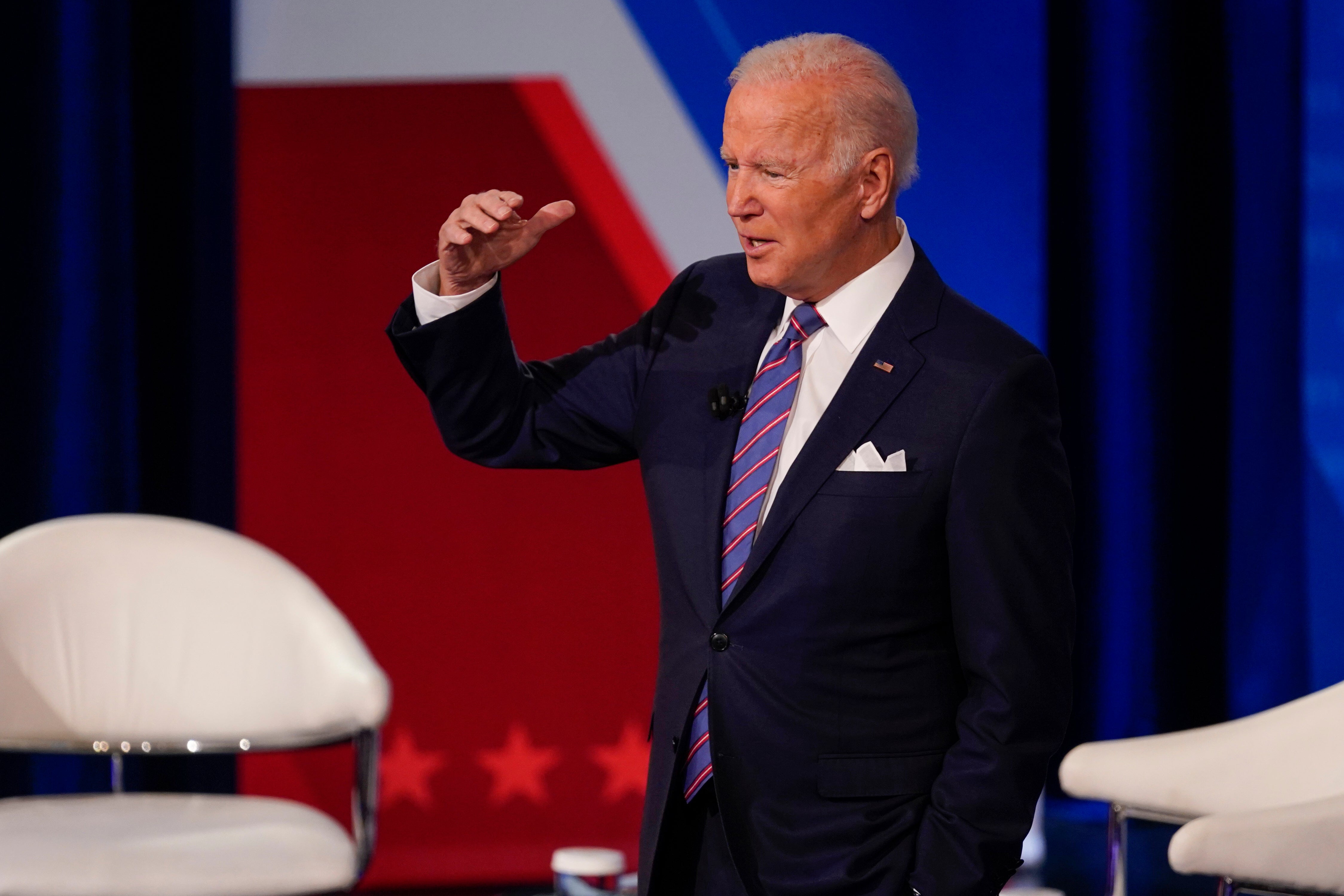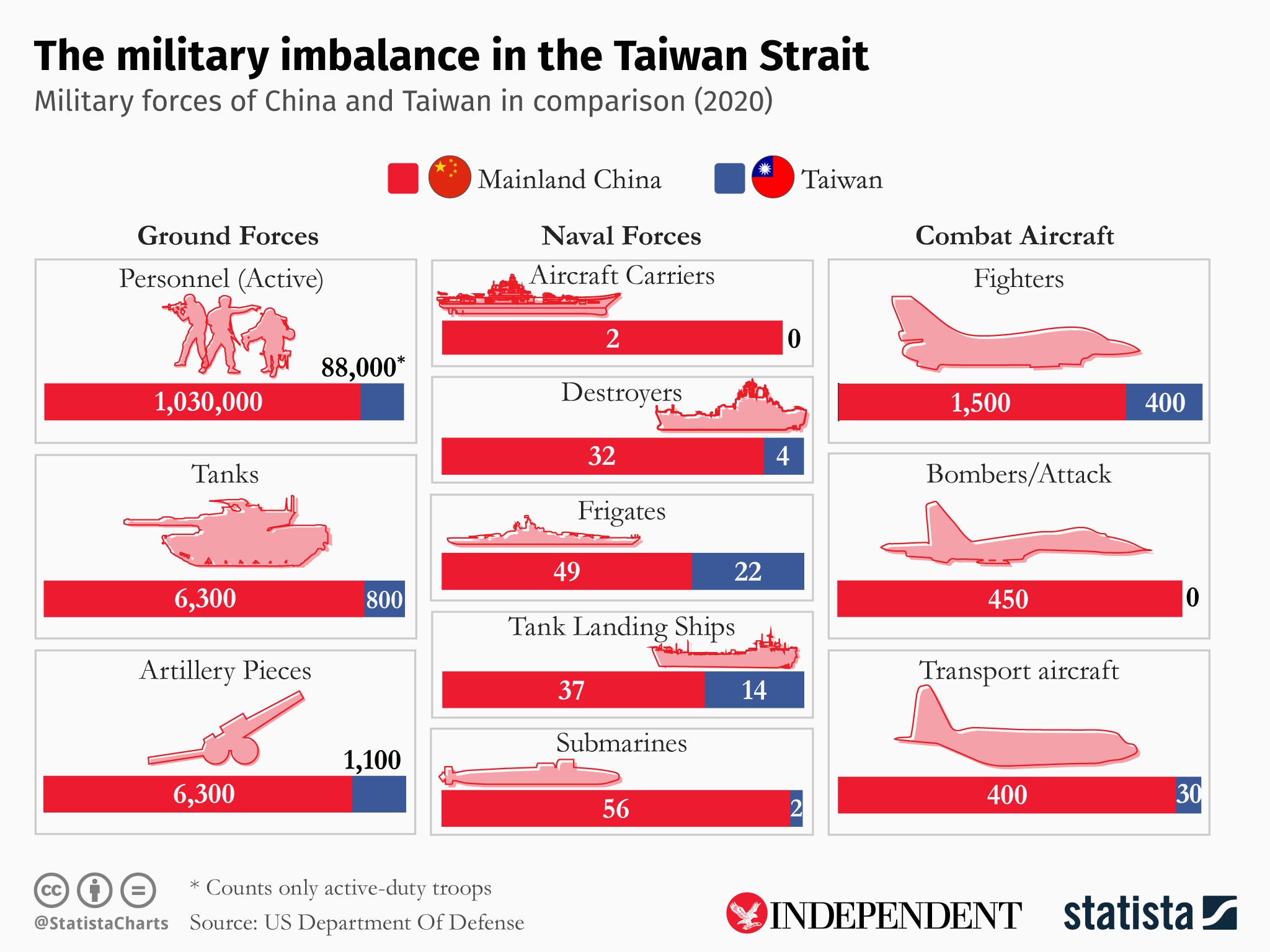China slams Biden’s threat to defend Taiwan in event of war
Biden said the US has a commitment to protect Taiwan in case of an attack which irritated Beijing

Your support helps us to tell the story
From reproductive rights to climate change to Big Tech, The Independent is on the ground when the story is developing. Whether it's investigating the financials of Elon Musk's pro-Trump PAC or producing our latest documentary, 'The A Word', which shines a light on the American women fighting for reproductive rights, we know how important it is to parse out the facts from the messaging.
At such a critical moment in US history, we need reporters on the ground. Your donation allows us to keep sending journalists to speak to both sides of the story.
The Independent is trusted by Americans across the entire political spectrum. And unlike many other quality news outlets, we choose not to lock Americans out of our reporting and analysis with paywalls. We believe quality journalism should be available to everyone, paid for by those who can afford it.
Your support makes all the difference.China has reacted with anger after US president Joe Biden seemed to confirm Washington will come to the defence of Taiwan if attacked.
Chinese foreign spokesperson Wang Wenbin said there was “no room” for compromise or concessions over Taiwan.
He said: “When it comes to issues related to China’s sovereignty and territorial integrity and other core interests, there is no room for China to compromise or make concessions.
“No one should underestimate the strong determination, firm will and strong ability of the Chinese people to defend national sovereignty and territorial integrity.
“Taiwan is an inalienable part of China’s territory. The Taiwan issue is purely an internal affair of China that allows no foreign intervention.”
Mr Biden warned for the second time since August that the US would defend Taiwan in an attack from China. The fresh comments are considered a possible departure from the longstanding “strategic ambiguity” policy.
Asked on TV whether the US would come to Taiwan’s defence, Mr Biden said: “Yes, we have a commitment to do that.”
China considers Taiwan a breakaway province and vows to take it by force if necessary.
Under president Xi Jinping, Beijing has stated clearly that the “reunification” of Taiwan with mainland China is an integral part of the rejuvenation of the Chinese nation and a historical mission for its ruling communist party.
China’s People’s Liberation Army has recently upped the ante in its pressure over the self-ruled democratic island.
At China’s National Day celebration this month, the PLA sent around 150 fighter jets and nuclear bombers to Taiwan’s air defence identification zone, in the biggest incursion since Taipei started to record such activities in September last year. Later, China conducted beach landing exercises on its side of the roughly 100-mile wide Taiwan Strait.

Mr Wang warned the US, “be cautious with its words and actions on the Taiwan issue and not send any wrong signals to the separatist forces of Taiwan independence, so as not to seriously damage China-US relations and peace and stability in the Taiwan Strait”.
Analysts say Chinese officials are mainly concerned messages of support from the US could make Taiwan’s independence-driven government take serious steps towards achieving full sovereignty.
China’s mounting military, diplomatic and economic pressure is a clear warning to Taiwan’s president Tsai Ing-Wen, who said this month that, “there should be absolutely no illusions that the Taiwanese people will bow to pressure”.
But she also cautioned against surprise moves, saying that Taiwan is already an independent country and will not take irrational measures towards independence.
On Friday, Taiwan’s presidential office said that it would not “rashly advance” in the face of support from other countries.
A White House spokesperson clarified that Mr Biden’s comments do not signal any change in policy.
The US has no official diplomatic ties with Taiwan. The Taiwan Relations Act vaguely states that it must provide the means to the island country to defend itself.
A White House spokesperson said: “The US defence relationship with Taiwan is guided by the Taiwan Relations Act. We will uphold our commitment under the Act, we will continue to support Taiwan’s self-defence and we will continue to oppose any unilateral changes to the status quo.”
Despite this, the US has been vague in the past about how it would help Taiwan in case of an attack under its “strategic ambiguity” policy and repeated its support to Taipei by stepping up arms sales.
State Department spokesman Ned Price said this month that American support for Taiwan is “rock solid”. The US has, “also been very clear that we are committed to deepening our ties with Taiwan”.
On the other hand, the US has ties with China and recognises China’s stated position that there is only one Chinese government.
This is not the first time that Mr Biden has announced that he will help Taiwan. In August, the White House had to clarify that the US had not changed its policy after Mr Biden took a similar stance in an interview.
On Wednesday, Biden’s choice for ambassador to Beijing, Nicholas Burns, told lawmakers considering his nomination that Americans should “have confidence in our strength” when dealing with the rise of China, a nation he said the US and its allies could manage.
Burns echoed the Biden administration’s stand on cooperating with China where possible but condemning many of its actions, including its policies towards Taiwan and semi-autonomous Hong Kong, where it has virtually eliminated dissident voices through stiff legislation and arrests.
Additional reporting by agencies
Join our commenting forum
Join thought-provoking conversations, follow other Independent readers and see their replies
Comments